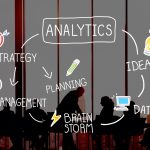New trends and transformations are emerging in the industry of data analysis, and there is emerging expertise that goes hand in hand with these changes. Moving forward into the year 2025, a data analyst is expected to have a combination of a deep understanding of relevant concepts, strong reasoning, and great interpersonal skills. With the increasing importance of correct data … [Read more...] about Essential Skills for the Modern Data Analyst in 2025
Big Data
Learn everything you need to know about big data. Find out how companies are using this revolutionary technology and what it means for your business strategy.
How DataOps Services Accelerate Effective Data Activation
In today's modern economy, data is everything-if it's refined, processed, and delivered at the right time and place. That's the role of DataOps. DataOps combines Agile methodologies, DevOps, and data engineering to optimize data workflows. Specifically, DataOps is crucial in speeding up data activation and letting organizations transform data into actionable insights at a great … [Read more...] about How DataOps Services Accelerate Effective Data Activation
Personalization at Scale: The Role of Data in Customer Experience
In the current era, businesses are increasingly using tailored consumer experiences to stand out in the competitive market. Customers now want firms to understand their unique preferences and provide content, goods, and services that are suited to them, making personalization a need rather than a luxury. Data plays a critical role in personalization, particularly when it comes … [Read more...] about Personalization at Scale: The Role of Data in Customer Experience
What Netflix, Amazon, and Spotify Teach Us About Data Monetization
In the modern world, the new currency is data, and Netflix, Amazon, and Spotify are at the forefront of discovering its full value. These platforms serve as prime examples of how the data can be monetized to create value, enhance customer satisfaction, and significantly increase revenue. Through data collection, analysis, and strategic implementation, these companies have … [Read more...] about What Netflix, Amazon, and Spotify Teach Us About Data Monetization
Free Up Your Leadership Capacity: Strategic Financial Management Through AP Automation
Running a business means juggling a hundred things at once. And if you're like most entrepreneurs, you've probably had moments where it felt like the admin work was swallowing your whole day. Here's a truth many leaders eventually learn: if you're spending too much time managing invoices and approvals, it's not just your time that's at risk'it's your growth. That's where AP … [Read more...] about Free Up Your Leadership Capacity: Strategic Financial Management Through AP Automation
What is big data?
Big data is a term that refers to the massive amount of digital data created and shared every day. Big data can transform how we live, work, and communicate. It can be used to improve everything from public health and urban planning to business and marketing.
Big data is also changing the way we think about privacy and security. The volume, velocity, and variety of big data present challenges and opportunities for organizations and individuals. Regardless, big data is here to stay, and its impact will only continue to grow in the years to come.
What is big data analytics?
Big data analytics is the process of turning large, complex data sets into actionable insights. Businesses use various analytical tools and techniques, including machine learning and statistical analysis, to do this.
Big data analytics can be used to improve decision-making in areas like marketing, operations, and customer service. It can also be used to identify new business opportunities and optimize existing processes. With the help of big data analysis, businesses can gain a competitive edge by using their data better.
Want to learn more about big data? Datafloq has courses available. Contact us to get started.
When was big data introduced?
The term big data was coined in the 1990s, with some giving credit to John Mashey for popularizing the term. However, the concept of big data has been around for much longer.
Where does big data come from?
In the early days of computing, scientists and businesses began to realize that the amount of data being generated was increasing exponentially. As a result, they began to develop new methods for storing and processing data.
Over time, these methods have become increasingly sophisticated and have played a key role in enabling businesses to make sense of vast amounts of information. Today, big data is used in various industries, from retail to healthcare, and its importance is only likely to grow in the years to come.
What are examples of big data?
One of the most common examples of big data is social media data. With over 2 billion active users, Facebook generates a huge amount of data every day. This includes information on user interactions, posts, and even location data. Analyzing this data can help companies better understand their customers and target their marketing efforts.
Another example of big data is GPS signals. These signals are constantly being generated by devices like cell phones and fitness trackers. When combined with other data sets, GPS signals can be used to provide insights into everything from traffic patterns to human behavior. Finally, weather patterns are another type of big data set. By tracking these patterns over time, scientists can better understand the impact of climate change and develop strategies for mitigating its effects.
How do companies use big data?
Companies use big data in marketing, product development, and customer service. By analyzing large data sets, businesses can identify patterns and trends that would be otherwise difficult to spot. For example, a company might use big data to track customer behavior patterns to improve its marketing efforts.
Alternatively, a company might use big data to improve its products by identifying areas where customers are most likely to experience problems. For instance, big data can be used to improve customer service by finding pain points in the customer journey. Ultimately, big data provides companies with a valuable tool for gaining insights into their business operations.






